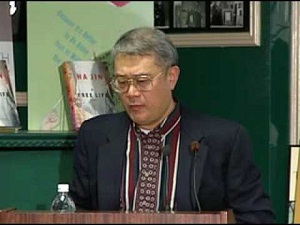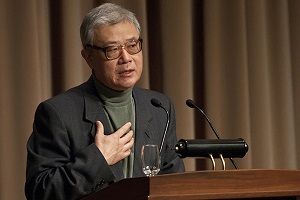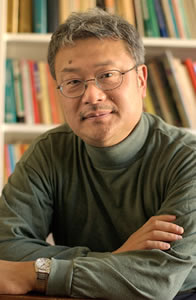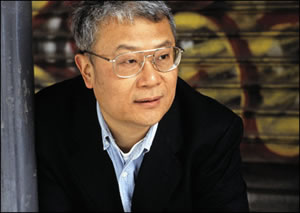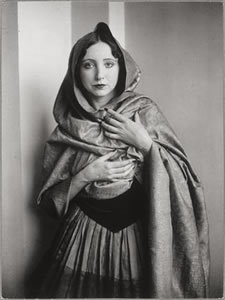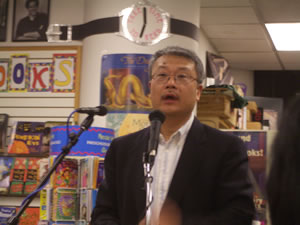De Vlaamse dichter, essayist, journalist en tijdschriftuitgever Herman de Coninck werd geboren in Mechelen op 21 februari 1944. Zie ook mijn blog van 21 februari 2007 en ook mijn blog van 21 februari 2008.
Ligstoel
Voor Jan Fabre
Het is een soort niets dat ik zoek. Wat je overhoudt
als je uit de kom van je beide handen hebt willen drinken:
je beide handen. Geuren lanterfanten door de tuin.
Ik heb een ligstoel onder me waarin ik zo laag als ik maar
in mezelf kan liggen, op mijn rug, het onderste wat ik heb, lig.
Hoe is dit liggen? Zoals je een cognac afmeet door het glas
horizontaal te leggen, zo is dit liggen, ik heb niet veel van mezelf
nodig om vol te zijn, wat ik nodig heb is vooral: weinig.
Er is te weinig weinig. De vergevensgezindheid
van het niets waarin wij, als we eveneens
niets zouden zijn, zouden passen.
De lucht is zo blauw als vergeetachtigheid.
De lucht is zo blauw als blauwsel waarmee destijds
linnen werd gewassen om witter te zijn.
Wiskunde
Nee, zo stoer hoeft niet, tenslotte
moet ik het nu weer allemaal zelf doen. Ik trek mij af.
Het lijkt wel een hele bewerking, een
aftrekking inderdaad, ik trek mij af
van wat ik was met jou,
ik hou alleen mezelf over.
November
Er hangen nog twee blaren
aan mijn esdoorn. Duizend andere zijn
rood geworden, alvorens dood.
Vergeten te kijken.
Vergeten gelukkig te zijn.
Nochtans had ik een tuin
waarin een stoel, en die stoel
had mij, en ik had een hand
en die hand had een glas
en mijn mond had meningen.
Alles had.
Alles had ons.
Herman de Coninck (21 februari 1944 – 22 mei 1997)
De Nederlandse dichter en prozaschrijver Hans Andreus werd geboren in Amsterdam op 21 februari 1926. Zie ook mijn blog van 21 februari 2007 en ook mijn blog van 21 februari 2008.
Dooi
Al plassen en wakken
tussen het riet.
Een laatste schaatser buigt
af naar de andere oever
grijzer nog dan het meer,
op weg naar huis en koffie
of op zoek
naar beter ijs.
Ik loop waar ik val
Ik loop waar ik val en mij op moet rapen.
Geen boom en geen struik en geen horizon.
Er hangen alweer stormen voor de zon.
Ik wou dat ik één uur, één uur kon slapen.
Heet mij toch welkom, wereld van vandaag.
Of van vandaag niet dan misschien van morgen.
Ik ga in mijn splinters en onweer verborgen
en ga alleen en weet niet wat ik vraag.
Maar ik wil de moed hebben tot het laatste,
niet meer aan mij denken of aan die ander
of aan wat mijn woorden aan zon terugkaatsten.
’s Nachts
De regen van noem mij desnoods geen regen
wordt door geen oor wordt door de huid gehoord.
Booglamplicht geeft waarom daarom zijn zegen;
de hemel zwijgt en zwijgt van enzovoort.
En niemand komt niemand dan niemand tegen.
En iemand zegt ik ben een iemandswoord.
En iemand zegt ik ben maar ben verzwegen.
De hemel zwijgt en zwijgt want enzovoort.
En wij wijzelf gaan wonderlijke wegen:
wij varen om de tropen van de noord
figuurlijk zelfs met ons figuur verlegen.
En staan op straat en lopen toch weer door ’t
noem mij desnoods noem mij desnoods dan regen.
De hemel zwijgt en zwijgt en enzovoort.
Hans Andreus (21 februari 1926 – 9 juni 1977)
Dichtersstaking’. Van links naar rechts: Hans Andreus, Louis Lehmann, Gerrit Kouwenaar, Sybren Polet, Simon Vinkenoog, Jan G. Elburg en Cees Nooteboom, Amsterdam, 1958
De Engelse dichter, essayist en criticus Wystan Hugh Auden werd geboren in York op 21 februari 1907. Zie ook mijn blog van 21 februari 2007 en ook mijn blog van 21 februari 2008.
Base Words Are Uttered
Base words are uttered only by the base
And can for such at once be understood,
But noble platitudes:–ah, there’s a case
Where the most careful scrutiny is needed
To tell a voice that’s genuinely good
From one that’s base but merely has succeeded.
Ganymede
He looked in all His wisdom from the throne
Down on that humble boy who kept the sheep,
And sent a dove; the dove returned alone:
Youth liked the music, but soon fell asleep.
But He had planned such future for the youth:
Surely, His duty now was to compel.
For later he would come to love the truth,
And own his gratitude. His eagle fell.
It did not work. His conversation bored
The boy who yawned and whistled and made faces,
And wriggled free from fatherly embraces;
But with the eagle he was always willing
To go where it suggested, and adored
And learnt from it so many ways of killing.
The Novelist
Encased in talent like a uniform,
The rank of every poet is well known;
They can amaze us like a thunderstorm,
Or die so young, or live for years alone.
They can dash forward like hussars: but he
Must struggle out of his boyish gift and learn
How to be plain and awkward, how to be
One after whom none think it worth to turn.
For, to achieve his lightest wish, he must
Become the whole of boredom, subject to
Vulgar complaints like love, among the Just
Be just, among the Filthy filthy too,
And in his own weak person, if he can,
Must suffer dully all the wrongs of Man.
W. H. Auden (21 februari 1907 – 29 september 1973)
De Franse schrijver Raymond Queneau werd geboren op 21 februari 1903 in Le Havre. Zie ook mijn blog van 21 februari 2007 en ook mijn blog van 21 februari 2008.
Uit: Exercices de style
A 12h17 dans un autobus de la ligne S, long de 10 mètres, large de 2,1, haut de 3,5, à 3 km 600 de son point de départ, alors qu’il était chargé de 48 personnes, un individu de sexe masculin, âgé de 27 ans 3 mois 8 jours, taille 1 m 72 et pesant 65 kg et portant sur la tête un chapeau haut de 17 centimètres, dont la calotte était entourée d’un ruban long de 35 centimètres, interpelle un homme âgé de 48 ans 4 mois 3 jours, taille 1 m 68 et pesant 77 kg, au moyen de quatorze mots dont l’énonciation dura 5 secondes et qui faisait allusion à des déplacements involontaires de 15 à 20 millimètres.
Litotes.
Nous étions quelques-uns à nous déplacer de conserve. Un jeune homme, qui n’avait pas l’air très intelligent, parla quelques instants avec un monsieur qui se trouvait à côté de lui, puis il alla s’asseoir. Deux heures plus tard, je le rencontrai de nouveau ; il était en compagnie d’un camarade et parlait chiffons.
Raymond Queneau (21 februari 1903 – 25 oktober 1976)
De Franse schrijfster Anaïs Nin werd geboren op 21 februari 1903 in Neuilly. Zie ook mijn blog van 21 februari 2007 en ook mijn blog van 21 februari 2008.
Uit: Journal 1931 ~ 1934
“June est venue chez moi lundi. Je voulais en finir avec les mystères, avec le suspense. Je lui ai demandé avec une cruauté et une brutalité qui auraient pu être celles de Henry (l’écrivain Henry Miller) : “Est-ce que vous aimez les femmes ? Avez-vous regardé en face votre attirance pour les femmes ?”
Sa réponse fut si calme : “Jean (son ancienne amie) était trop masculine. J’ai fait face à mes sentiments. J’en suis pleinement consciente. Mais je n’ai encore jamais rencontré personne avec qui j’aurais désiré les vivre jusqu’au bout. D’ailleurs je ne sais pas au juste ce que je veux vivre jusqu’au bout.”
Puis elle s’est dérobée à mes questions (…). Ses mains tremblaient. Elle était agitée. J’avais honte d’avoir été aussi directe. J’étais intensément nerveuse. Elle me dit qu’au restaurant elle avait voulu regarder mes pieds nus dans les sandales mais n’avait pu s’y résoudre. Je lui dis que j’avais eu peur de regarder son corps, malgré l’envie que j’éprouvais. Nous parlions à bâtons rompus, de façon chaotique (…). Notre nervosité était insupportable.
Je vis alors la beauté de son corps que je n’avais pas osé regarder, je vis sa plénitude, sa densité, et sa richesse me submergea.
Lorsqu’elle était en bas sur le divan, l’échancrure de sa robe noire laissait voir la naissance de sa gorge admirable. Je tremblais. J’avais conscience de mes sentiments et de nos désirs inarticulés. Elle tenait des propos sans suite mais je savais maintenant qu’elle parlait pour couvrir une conversation plus profonde, parlait à l’encontre de ce que nous ne pouvions exprimer.“
Anaïs Nin (21 februari 1903 – 14 januari 1977)
De Amerikaanse schrijver David Foster Wallace werd geboren op 21 februari 1962 in New York. Hij debuteerde in 1987 met The Broom of the System. In 1996 vestigde hij zijn reputatie met het postmoderne en complexe Infinite Jest, een boek van ruim 1.000 pagina’s barstensvol donkere humor, dat ‘verslaving’ als rode draad had. Vergelijkingen met Thomas Pynchon, Jorge Luis Borges en Don De Lillo werden gemaakt. Een van de handelsmerken van Foster Wallace bleek trouwens het gebruik van voetnoten: Infinite Jest bevatte achteraan liefst 100 pagina’s met voetnoten. Time Magazine plaatste het boek in zijn lijst van 100 beste Engelstalige romans van de periode 1923-2005. Wallace publiceerde ook talloze korte verhalen, onder meer in Esquire, Harper’s, The New Yorker en de Paris Review. Ze werden gebundeld in Girl With Curious Hair en Brief Interviews With Hideous Men. Hij schreef ook essays, gebundeld in onder
meer A Supposedly Fun Thing I’ll Never Do Again en Consider the Lobster.
Uit: Infinite Jest
“I am seated in an office, surrounded by heads and bodies. My posture is consciously congruent to the shape of my hard chair. This is a cold room in University Administration, wood-walled, Remington-hung, double-windowed against the November heat, insulated from Administrative sounds by the reception area outside, at which Uncle Charles, Mr. deLint and I were lately received.
I am in here.
Three faces have resolved into place above summer-weight sportcoats and half-Windsors across a polished pine conference table shiny with the spidered light of an Arizona noon. These are three Deans–of Admissions, Academic Affairs, Athletic Affairs. I do not know which face belongs to whom.
I believe I appear neutral, maybe even pleasant, though I’ve been coached to err on the side of neutrality and not attempt what would feel to me like a pleasant expression or smile.
I have committed to crossing my legs I hope carefully, ankle on knee, hands together in the lap of my slacks. My fingers are mated into a mirrored series of what manifests, to me, as the letter X. The interview room’s other personnel include: the University’s Director of Composition, its varsity tennis coach, and Academy protector Mr. A. deLint. C.T. is beside me; the others sit, stand and stand, respectively, at the periphery of my focus. The tennis coach jingles pocket-change. There is something vaguely digestive about the room’s odor. The high-traction sole of my complimentary Nike sneaker runs parallel to the wobbling loafer of my mother’s half-brother, here in his capacity as Headmaster, sitting in the chair to what I hope is my immediate right, also facing Deans.”
David Foster Wallace (21 februari 1962 – 12 september 2008)
De Amerikaanse schrijver en journalist Chuck Palahniuk werd geboren op 21 februari 1962 in Pasco, Washington.. Nadat David Fincher in 1999 zijn debuutroman Fight Club uit 1996 verfilmde, met in de hoofdrollen Brad Pitt en Edward Norton, werd de voormalige Amerikaanse truckmonteur Palahniuk in één klap beroemd. Inmiddels is Palahniuk een cult-held en de trots van Portland, Oregon, de stad waar hij sinds 1980 woont. Na Fight Club publiceerde hij nog vijf andere romans (Survivor, Invisible Monsters, Choke, Lullaby en Diary). Ook van deze boeken zijn de filmrechten verkocht.
Uit: Fight Club
“This week the insomnia is back. Insomnia, and now the whole world figures to stop by and take a dump on my grave.
My boss is wearing his gray tie so today must be a Tuesday.
My boss brings a sheet of paper to my desk and asks if I’m looking for something. This paper was left in the copy machine, he says, and begins to read:
“The first rule of fight club is you don’t t
alk about fight club.”
His eyes go side to side across the paper, and he giggles.
“The second rule of fight club is you don’t talk about fight club.”
I hear Tyler’s words come out of my boss, Mister Boss with his midlife spread and family photo on his desk and his dreams about early retirement and winters spent at a trailer park hookup in some Arizona desert. My boss, with his extra-starched shirts and standing appointment for a haircut every Tuesday after lunch, he looks at me, and he says:
“I hope this isn’t yours.”
I am Joe’s Blood-Boiling Rage.
Tyler asked me to type up the fight club rules and make him ten copies. Not nine, not eleven. Tyler says, ten. Still I have the insomnia, and can’t remember sleeping since three nights ago. This must be the original I typed. I made ten copies, and forgot the original. The paparazzi flash of the copy machine in my face. The insomnia distance of everything, a copy of a copy of a copy. You can’t touch anything, and nothing can touch you.
My boss reads:
“The third rule of fight club is two men per fight.”
Neither of us blinks.
My boss reads:
“One fight at a time.”
I haven’t slept in three days unless I’m sleeping now. My boss shakes the paper under my nose. What about it, he says. Is this some little game I’m playing on company time? I’m paid for my full attention, not to waste time with little war games. And I’m not paid to abuse the copy machines.”
Chuck Palahniuk (Pasco, 21 februari 1962)
De Franse schrijfster Laure Limongi werd geboren op 21 februari 1976 in Bastia (Corsica). Naast boeken schrijft zij ook regelmatig artikelen en kritieken voor bladen als La Revue Littéraire, Les Lettres Françaises en CCP. Tegenwoordig woont zij in Parijs.
Uit: Je ne sais rien d’un homme quand je sais qu’il s’appelle Jacques
« … Certains jours, Jack aimerait écrire «une littérature qui se voit de loin». Il pense que ce serait utile, un peu comme les panneaux de signalisation, dans la rue. Sa contribution à l’ordre universel. Une clarification de la lecture du monde. La grammaire l’aiderait à tracer des droites et des angles droits, bannisant les courbes, les mouvements désordonnés. Il rêve de grandes pages A4 noircies en Times corps 11 sans trous, sans détours, avec de jolies marges, des points, des virgules, des paragraphes. Et même des guillemets. Ainsi les énoncés ne seraient-ils plus équivoques et peut-être l’angoisse moindre. Jack pense aussi que ça pourrait l’aider à cerner ses «je» et peut-être même à n’en garder qu’un. Mais Jack se moque gentiment de lui : «Encore une bonne résolution, sans doute». Et arrêter de fumer et aller à la piscine et ne pas laisser traîner le courrier… Il proteste. Il s
’agit de plan, de lieux communs, de contraintes. Un peu comme jouer aux échecs, distraire son ennui. Rien que de très accessible. Et dire : «qu’il était bleu le ciel» et «verte la vallée», etc. Ça n’a rien de démesuré, ça n’a rien de honteux. Jack se tord de rire en le traitant de gros sentimental.“

Laure Limongi (Bastia 21, februari 1976)
De Chinees-Amerikaanse schrijver Ha Jin werd geboren op 21 februari 1956 in Jinzhou, China. Ha Jin was soldaat in het Chinese Volksleger. Hij leerde zichzelf Engels door naar de Amerikaanse radio te luisteren. In 1985 emigreerde hij naar de VS. Hij studeerde Amerikaanse literatuur en promoveerde aan Brandeis University. Momenteel doceert hij creative writing aan de Emory University in Atlanta. Ha Jin publiceerde twee dichtbundels, twee verhalenbundels en twee romans. Zijn werk werd bekroond met vele literaire prijzen.
Uit: Waiting
“The next summer Lin and Shuyu went to the divorce court again. The day before setting out for Wujia Town, he had talked with her, promising to take good care of her and their daughter after the divorce, so she had agreed to it. He told her that all he wanted was a home in the city.
They waited almost an hour in the courtroom before the judge appeared. He was a tall police officer who had just been promoted to the position; he was so corpulent that he had no neck. Having sat down on a scarlet leatherette chair, the judge licked his buck teeth, then peered at the couple with one eye open and the other shut, as though aiming a gun. His broad, greasy face reminded Lin of the day statue of a local god in the Divine Horse Shrine west of Goose Village. With his left hand picking a wart under his nostril and with his right forefinger pointing at Lin, the judge ordered, “Now, present your case.”
Lin began with a slight stammer: “Respectable Judge, I–I came here today to beg you to allow me to divorce my wife. We have been separated for six years, and there’s no love between us anymore. According to the Marriage Law, every citizen has the freedom to choose a wife or a hus-“
Ha Jin (Jinzhou, 21 februari 1956)
De Duitse schrijver Ingomar von Kieseritzky werd geboren op 21 februari 1944 in Dresden. Hij stamt uit een Baltische adelijke familie. Voordat hij in 1971 zelfstandig schrijver werd was hij requisteur en boekhandelaar in o.a. Berlijn en Göttingen. Kieseritzky schrijft aan de ene kant experimenteel proza, maar heeft aan de andere kant ook meer dan honderd hoorspelen op zijn naam staan.
Uit: Da kann man nichts machen
„Kurz hinter der Station Pardubice fand der Schaffner des Vindobona, Vicovic, in der Toilette des leeren Wagens 265 einen mittelgroßen Herrn, der, tot, mit herabgelassenen Hosen extrem bequem zurückgelehnt, auf dem rauchfarbenen Klosettdeckel saß. Er sah so friedlich aus wie ein schlafender Säugling und zeigte ungerührt seine beiden häßlichen, keulenartigen Knie. Vicovic bewaffnete seine Augen mit einer Sonnenbrille; sofort wurde die enge Kabine schön, der Spiegel erstrahlte in einem rostigen Gold.
Gottlob hatte sich dieser stille Passagier keiner letzten Lockerung überlassen; da kannte Vicovic ganz andere Fälle – unreinliche Selbstmorde, Herzinfarkte mit Entleerung, aber auch triviale Alkoholiker, die sich ungeniert erleichtert hatten. Dieser Herr roch nicht schlecht, ja, er war von begrüßenswerter Geruchlosigkeit, was eine Bearbeitung dieses Falls auf engstem Raum zu einem Kinderspiel machte.
Personalien sind immer interessant; der stille Herr hieß (so sagte der Paß in der Brieftasche)
Randolf v. K. und war (nach der Fahrkarte 2. Klasse zu schließen) auf dem Weg von Berlin nach Wien. Der Mann sah leidend aus, als habe er eine langwierige Kur überstanden. Sein Kopf mit dünnen Haaren ruhte auf dem Spülkasten und folgte getreulich jedem Schwanken des Zuges. Sein Mund war leicht geöffnet. Er noch nach einem süßen Tonicum, das Vicovic an Orangenlikör erinnerte; vielleicht eine Medizin, die wohlschmeckend war.“
Ingomar von Kieseritzky (Dresden, 21 februari 1944)
De Japanse dichteres Ishigaki Rin werd geboren op 21 februari 1920 in Tokio. Zij werkte tot aan haar pensioen bij een bank en bvleef ongetrouwd. Als lid van een literaire kring van haar bank begon zij met het schrijven van gedichten. In 1959 verscheen haar eerste bundel. Voor haar tweede bundel, die in 1968 verscheen kreeg zij de prijs voor de beste dichtbundel van het jaar.
Nameplates
When you live in a place
you’d best provide the nameplate yourself.
When you abide in a space
the nameplate another affixes
never works out.
I went to the hospital and
they added “Ms” to the card on the sickroom door
“Ms Ishigaki Rin”
At a hotel
they put no name on the room
but when I get in the cremation oven
and they slam the door, the tag they hang will say
“Ishigaki Rin, Esquire.”
And much they’ll care what I think then.
“Ms” or “Esquire”
neither fits.
When you live somewhere
you’d best hang out the nameplate yourself.
And to the space where your spirit dwells
a nameplate must never be affixed
by any other hand.
Ishigaki Rin: that will do.
Ishigaki Rin (21 februari 1920 – 26 december 2004)
De Spaanse dichter en schrijver José Zorrilla y Moral werd geboren op 21 februari 1817 in Valladolid. Toen hij 22 was trouwde hij met een Ierse weduwe die al een zoon had. Een gemeenschappelijk kind stierf al vroeg. Voor haar jaloezie vluchtte Zorrilla twee maal naar Frankrijk waar hij in contact kwam met Alexandre Dumas, Théophile Gautier, Alfred de Musset, George Sand en Victor Hugo. Later ging hij naar Mexico waar hij van 1854 tot 1866 leefde onder de protectie van keizer Maximiliaan die hem tot theaterdirecteur benoemde. Zijn bekendste stuk is Don Juan Tenorio dat in Spanje nog steeds tijdens Allerzielen wordt opgevoerd.
Uit: Don Juan Tenorio
The Inn of Cristófano Buttarelli. A door at the back leads out to the street: tables, jugs and other utensils appropriate for such a place.
SCENE I
(Don Juan, masked, seated at a table, writing. Buttarelli and Ciutti, to one side, waiting. As the curtain rises, in the background one can see through the door at the back people wearing masks, students, people with torches, musicians, etc.)
DON JUAN: How they shout those devils!
Let me be damned by forked lightning
if when this letter I’m writing
is done, I don’t end their revels!
(He continues writing.)
BUTTARELLI: (To Ciutti) A good Carnival.
CIUTTI: (To Buttarelli) A good harvest
for re-filling the coffers.
BUTTARELLI: Hey! No fun and plenty of bother
running around in Seville’s dust.
And you don’t catch such good fish here,
since these inns don’t find favour
with gentlemen who are wealthy:
or even, at times, the masses.
CIUTTI: But today…
BUTTARELLI: Is not in the reckoning.
Good work’s already been done.
CIUTTI: Shhh! Talk a little less loud then,
or my master will soon be beckoning.
BUTTARELLI: So you’re his servant?
CIUTTI: For a year.
BUTTARELLI: And how’s it been?
CIUTTI: No abbot to equal me’s been seen,
I’ve all I ever could want.
Good women and good wine,
free time, and a full pocket,
BUTTARELLI: My God, what a racket!
José Zorrilla y Moral (21 februari 1817 – 23 januari 1893)
De Nederlandse schrijver Justus van Effen werd geboren in Utrecht op 21 februari 1684. Zie ook mijn blog van 21 februari 2007.
Uit: Zelfkennis en critiek
„En wat de schare onzer Poëten of Rijmkunstenaars betreft, hun omzichtig zwoegen had althans dit goede gevolg, dat de rhythmische toonval voor goed dien stempel van keurigheid en vloeiendheid kreeg, dien hij niet meer kon verliezen, en waardoor een passend kleed vaardig werd, waarin de dichterlijke gedachte zich kon hullen, zoo zij later weer eens bij ons ontkiemde.
Zoo de geestelooze rijmelarij geen diepen en vooral geen blijvenden indruk kon maken, toch heeft de kunstarmoede, die men voor hooge kunstontwikkeling aanzag, geruimen tijd op onzen smaak en onze letterkundige critiek den nadeeligsten invloed geoefend. Dat was de treurige nasleep van die camaraderie, die ‘cabale’, welke alles ophemelde en voor alles een lofgalm of een ‘wierookdampje’ overhad.“
Justus van Effen (21 februari 1684 – 18 september 1735)
Justus van Effen, gravure door J.C.G. Fritzsch, 1735
